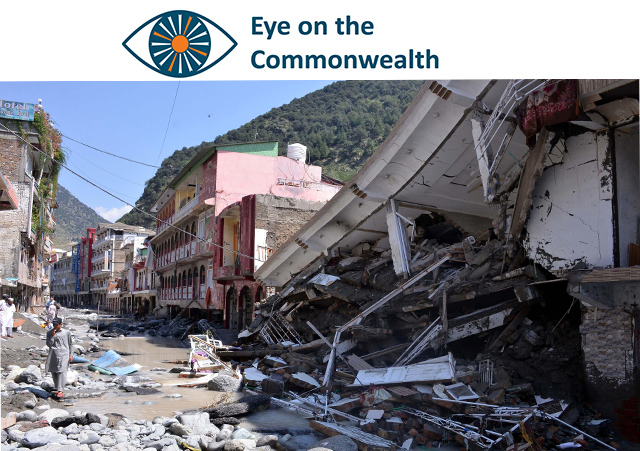 5 September: Damaged buildings are seen after flash floods in the Bahrain area of northwest Pakistan's Swat district. [photo: Xinhua / Alamy Stock Photo]
5 September: Damaged buildings are seen after flash floods in the Bahrain area of northwest Pakistan's Swat district. [photo: Xinhua / Alamy Stock Photo]
The scenes from Pakistan have been truly apocalyptic. After rains that fell almost continuously for three months – what the UN secretary-general, António Guterres, called a ‘monsoon on steroids’ – 33 million people and 72% of Pakistan have been hit by devastating floods. The prime minister, Shehbaz Sharif, called it ‘the toughest moment in the history of Pakistan’.
Rainfall in Balochistan and Sindh was more than five times the provinces’ 30-year average; one place in Sindh reported 1,288mm of rain, compared with August’s average of 46mm. Nasa’s satellite images of the Indus river show farmland transformed into an estuary. People fled to any higher ground left, such as railways, as 3,000km of roads and 129 bridges were washed away. One man, Roaan Ali, said: ‘We rushed here at 2am when the floods came. Now we’re stranded: there’s no path to get out … We have nothing: no hut to sleep in, no tent, nothing to eat. All our houses, our cattle, our wheat, are drowned and underwater.’
With at least 1,314 people killed, the death toll looks set to overtake that of 2010’s deluge, hitherto the worst on record. The UN refugee agency, UNHCR, said 300,000 houses had been destroyed; 8,000 sq km (2m acres) of farmland inundated; and 735,000 livestock killed. Diarrhoea, cholera, dengue, malaria are spreading amid a lack of clean drinking water, but medical care is limited after 432 clinics were destroyed.
Yet only three months ago, Pakistan was sweltering in record temperatures of 51C (122F), as summer heat began two months early. North-west and central India had the hottest April in 122 years. Land temperatures reached 60C, halving crop yields. ‘This is the first time the weather has wreaked such havoc on our crops,’ said Ghulam Sarwar Shahwani, a farmer. Amid unprecedented demand for power, India faced its worst electricity shortages in 60 years.
Building more common wealth in a climate changed world
#Lossanddamage: The next step for the Commonwealth’s small states
Climate change and the increasing vulnerability of the poor in the Commonwealth
Meanwhile, the Horn of Africa is gripped by drought, with 942,000 infants acutely malnourished, 4.1 million people struggling for food, and 1.5 million livestock dead. Even Canada has been baking in a climate emergency (though not on the scale of last year, when British Colombia reached 49.6C and 619 people died in the heat).
Sherry Rehman, Pakistan’s climate-change minister, called it ‘a climate catastrophe of epic scale’. Emission targets had to be reconsidered, as well as reparations for weather-related disasters, she said. ‘I wince when I hear people say these are natural disasters. These are man-made disasters.
‘Global warming is the existential crisis facing the world and Pakistan is ground zero, yet we have contributed less than 1% to emissions,’ she said. ‘Pledges made in multilateral forums have not been fulfilled … There is so much loss and damage with so little reparations to countries that contributed so little to the world’s carbon footprint that obviously the bargain made between the global north and global south is not working,’ said Rehman, calling for ‘a reset of the targets, because climate change is accelerating much faster than predicted.’
Rehman suggested fossil-fuel companies should pay for damage they were causing. ‘Big polluters often try to greenwash their emissions but you can’t walk away from the reality that big corporations that have net profits bigger than the GDP of many countries need to take responsibility.’ For Mustafa Nawaz Khokar, a Pakistani senator, countries on the climate-crisis frontline had to unite at UN Cop summits to pressure rich polluters to establish a fund to mitigate these disasters. Guterres agrees, tweeting: ‘People living in hotspots are 15 times more likely to die from climate impacts. It is outrageous that global emissions are still rising & that #ClimateAction is put on the back burner.’
Climate change – challenges, issues and Commonwealth responses – special edition
Good Cop26, bad Cop: did UN climate summit succeed or fail?
The West undoubtedly bears a heavy responsibility for its industrialisation’s climate legacy. ‘We are suffering from it but it is not our fault at all,’ said Pakistan’s PM, Shehbaz Sharif. Yet the developing world’s governments are also accused of ignoring the plight of their citizens. ‘The heat is increasing every year but the government, including [Jacobabad’s] district administration, is not paying any attention,’ one Sindhi lamented. Deforestation has exacerbated overheating in cities and countryside; administrators deny that corruption is responsible for substandard infrastructure, such as the failure of 12 dams in Balochistan.
Maryam Jamali, 19, saw the mud-brick homes of her Balochistan village washed away. She told the New Humanitarian: ‘Our irrigation departments are not in touch with locals, our environmental protection agencies are not in touch with locals, and the Balochistan disaster management authority is currently the most useless institution in the country,’ she said. ‘While climate change is important in water policy and government discourse, I think the federal and provincial governments place a lot of blame on climate change and use it as a scapegoat for their own incompetence.’
But how much are developing nations responsible for inept and corrupt regimes often imposed by departing imperial powers? For Shozab Raza, an anthropologist at Yale, rural Pakistanis’ ‘tragic predicament is ultimately a consequence of empire and an accomplice elite … Beyond climate reparations, what Pakistan really needs are colonial reparations.’
Oren Gruenbaum is a member of the Round Table Editorial Board
‘Eye on the Commonwealth’ columns look at current issues facing the Commonwealth



